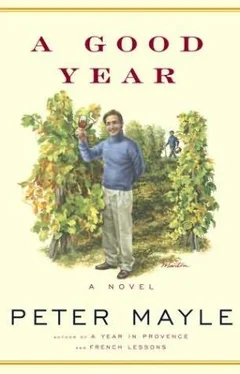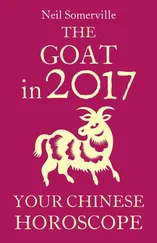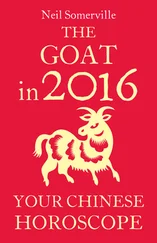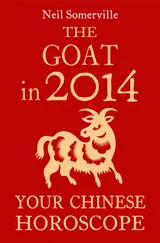Peter Mayle - A Good Year
Здесь есть возможность читать онлайн «Peter Mayle - A Good Year» весь текст электронной книги совершенно бесплатно (целиком полную версию без сокращений). В некоторых случаях можно слушать аудио, скачать через торрент в формате fb2 и присутствует краткое содержание. Жанр: Современная проза, на английском языке. Описание произведения, (предисловие) а так же отзывы посетителей доступны на портале библиотеки ЛибКат.
- Название:A Good Year
- Автор:
- Жанр:
- Год:неизвестен
- ISBN:нет данных
- Рейтинг книги:5 / 5. Голосов: 1
-
Избранное:Добавить в избранное
- Отзывы:
-
Ваша оценка:
A Good Year: краткое содержание, описание и аннотация
Предлагаем к чтению аннотацию, описание, краткое содержание или предисловие (зависит от того, что написал сам автор книги «A Good Year»). Если вы не нашли необходимую информацию о книге — напишите в комментариях, мы постараемся отыскать её.
Mayle's breezy, uncomplicated fifth novel (Chasing Cezanne, etc.) and ninth book follows 30-something Max Skinner from a sabotaged financial career in London to his adoption of the Provençal lifestyle on an inherited vineyard in France. Max spent holidays at his Uncle Henry's vineyard as a child, so when he inherits the place, the prospect of returning is tempting; a generous "bridging loan" from ex-brother-in-law Charlie seals the deal. The estate, Le Griffon, is in a dire state of disrepair and the wine cellar is filled with bottles of a dreadful-tasting swill, but it's nothing that vineyard caretaker Claude Roussel and prim housekeeper Madame Passepartout can't resolve. Max settles into his new life easily thanks to the attentions of local notary Nathalie Auzet and busty cafe owner Fanny. The arrival of young Californian "wine brat" Christie Roberts, Uncle Henry's long-lost daughter, complicates matters for Max, but her surprise offer and Charlie's arrival lessen the impact of a vicious vineyard scandal involving a delicious, high-priced, discreetly produced wine called Le Coin Perdu. Mayle's simple story provides lighthearted if unadventurous reading and a fond endorsement of the pleasures of viniculture.
From The Washington Post
Even a hyperactive terrier will sometimes melt to the floor, paws in the air and tongue alop, when he's approached by someone he trusts. But will he get a soul-satisfying belly rub this time or just a quick pat and tickle? The expectant pooch never knows.
So it is for fans of Peter Mayle, who became the adoptive bard of Provence with his phenomenally successful A Year in Provence. Will admirers open the ex-advertising man's ninth book and find the Mayle whose eye for detail and ear for language make for satisfying wallows in the south of France (the original Year, Hotel Pastis, Anything Considered) or the Mayle who sometimes slices the saucisson a bit thin in an effort to perpetuate his franchise (Toujours Provence, Encore Provence)?
The short answer is that A Good Year, Mayle's latest fictional confection, winds up slightly in the latter category. Once again we have the beleaguered Brit at an unhappy crossroad. In Hotel Pastis it was Simon Shaw being stripped bare by his newly minted ex-wife; in Anything Considered it was Bennett, the Brit on his uppers trying to score by flushing toilets in closed-up manor houses to keep an invented strain of dung beetles from invading the plumbing lines (that actually was funny). And once again the sunny south comes to the rescue, with the potential for making a living without losing one's soul, with a rasher of busty, leggy women and, of course, with good food and drink.
But, as the creators of television's "Law and Order" understand, why tamper with a winning formula? And thus are we launched into the marginal life of Max Skinner, a London investment banker suddenly deal-less and jobless on the streets of the City, where the day's weather forecast is for "scattered showers, followed by outbreaks of heavier rain, with a chance of hail."
And all this is followed, in Peter Mayle's classic caper formula, by timely good luck (inheritance, on the very day he loses his job, of a beloved uncle's big old house and vineyard in the hilly Luberon region of Provence), more good luck (dishy village maidens and a languid new lifestyle to explore), a halfway-engaging intrigue (an unknown American rival for the estate and the mysterious interest in vines that seem to produce nothing but pipi de chat – you know, cat pee) and then more good luck (they all drink happily every after). Coming soon to a movie theater near you, thanks to filmmaker Ridley Scott, whose "nose for a good story" got Mayle started on the rather thin plot and who already has "A Good Year" in production.
Are we just being cranky? Maybe. There really is a comfort factor that assures long, profitable lives to characters – fictional detectives, for instance – whose next formula book readers learn to anticipate. But when the formula is presented practically bare-bones, with only cursory attempts at embellishment, heretofore faithful readers may walk away feeling they've been snookered.
Mayle's deftness with detail – grace notes rather than entire imagery-laden passages – has been thoroughly catalogued. But there's detail that moves you right along: "He turned off the N7 toward Rognes and followed the narrow road that twisted through groves of pine and oak, warm air coming through the open window, the sound of Patrick Bruel whispering 'Parlez-moi d'amour' trickling like honey from the radio." (Okay, moves you along with a little huffing and puffing.) And then there's detail that stops you cold: " 'Air France to Marseille?' The girl at the desk didn't even bother to consult her computer. 'Out of luck there, sir. Air France doesn't fly direct to Marseille from London anymore. I could try British Airways.' "
Yes, by all means, please do.
The caper in A Good Year revolves around a mysterious small-batch cult wine that never makes it to the wine store and trades as an investment. But given that the bulk of Mayle's faithful are presumed Francophiles and therefore at least marginally interested in viticulture, the false note on page 90 is perplexing. As Max inspects his vineyard for the first time he finds a piece of his land that "sloped away gently down to the east… the surface appeared to consist entirely of jagged limestone pebbles, blinding white in the sun, warm to the touch, an immense natural radiator. It seemed unlikely that even the most undemanding of weeds could find sufficient nourishment to grow here. And yet the vines appeared to be healthy."
Perhaps Max has never read descriptions of the poor, gravelly soil in many of the finest districts of Bordeaux, source of some of the priciest wines in the world. But those who have done so are doomed to spend the next 197 pages wondering why Mayle would give the game away so early. Kindly interpretation: We're meant to read on, smiling slightly, feeling superior to poor Max. Or, darker thought: Mayle thinks we're clueless enough to fall for this.
Even as venerable a novelist as Graham Greene recognized that lighter fare – Our Man in Havana, Stamboul Train – had a role to play in his life as a writer and ours as readers. He nonetheless flinched slightly, labeling these works "entertainments." As entertaining as Peter Mayle can be, he might aim a bit higher – if not for his own entertainment, then for ours.
Wafer-thin saucisson, oui. Pipi de chat on the rocks? Non!
***
In A Good Year, Max Skinner's London career has just taken a nosedive when he suddenly inherits his uncle's vineyard in Provence. Leaving one life behind to start another, Max soon discovers that the wine made on his uncle's land is swill, but he's captivated by the village, landscape, weather, and the beautiful notaire. He can't understand why the caretaker is so eager to buy the land when the wine is so bad, and then a woman claiming to be his uncle's long-lost daughter arrives from California with her claim on the property. Max's new life threatens to fall out from under him before it can even take off. Peter Mayle (author of A Year in Provence) has written a light-hearted novel that has received positive reviews. BookPage says, "Brimming with colorful, eccentric characters, A Good Year offers both a behind-the-scenes peek at the high-stakes wine business and a voyeuristic portrait of Provencal village life. Richly evocative of the pleasures of both place and palate, Mayle's latest is sure to entertain and delight his many devotees."















